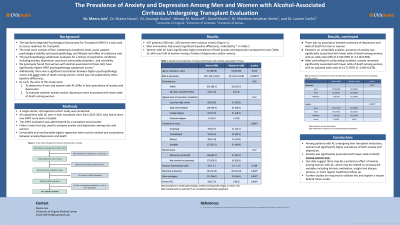Tuesday Poster Session
Category: Liver
P3792 - The Prevalence of Anxiety and Depression Among Men and Women with Alcohol-Associated Cirrhosis Undergoing Transplant Evaluation
Tuesday, October 24, 2023
10:30 AM - 4:00 PM PT
Location: Exhibit Hall

Has Audio

Meera Jain, MD
University of Virginia
Charlottesville, VA
Presenting Author(s)
Meera Jain, MD1, Shaina Hasan, MD1, Anuragh Gudur, MD2, Wendy Novicoff, PhD3, David Martin, PhD1, Matthew Stotts, MD, MPH4, Lauren Carlini, MD, MSCR1
1University of Virginia, Charlottesville, VA; 2UVA, Charlottesville, VA; 3University of Virginia School of Medicine, Charlottesville, VA; 4HealthONE, Denver, CO
Introduction: The Stanford Integrated Psychological Assessment for Transplant (SIPAT) is a tool used to quantify a potential transplant candidate’s level of psychosocial risk, with higher scores indicating higher risk. We previously found that women with alcohol-associated cirrhosis (AC) have significantly higher SIPAT psychopathology subdomain scores. There was also an association between higher psychopathology scores and lower odds of death among women. It was hypothesized that these higher scores among women were driven by higher comorbid anxiety and depression. In this study, we aimed to determine if men and women with AC differ in their prevalence of anxiety and depression. We also evaluated whether anxiety and depression were associated with lower odds of death among women.
Methods: A single-center, retrospective cohort study was conducted. All outpatients with AC (seen initially between 2015 and 2021) who had at least one SIPAT evaluation during liver transplant workup were included. In addition to the previously collected data regarding patient characteristics and outcomes, data was collected from the initial SIPAT evaluation about anxiety and depression history. Fisher’s exact test was used to compare anxiety and depression among men and women. Univariable and multivariable logistic regression were used to analyze whether there were any associations between anxiety/depression and death.
Results: 447 patients (338 men, 109 women) were included. Women with AC undergoing workup for liver transplant had a significantly higher prevalence of both anxiety and depression (Table 1). On univariable analysis, presence of depression was not associated with death for men or women. However, presence of anxiety was significantly associated with lower odds of death among women, with an odds ratio (OR) of 0.334 (95% CI: 0.118-0.950). After controlling for other variables, anxiety remained significantly associated with lower odds of death among women, with an adjusted OR of 0.172 (95% CI: 0.044-0.678).
Discussion: Among patients with AC undergoing transplant evaluation, women had a significantly higher prevalence of both anxiety and depression. The presence of anxiety was significantly associated with lower odds of death among women, even after controlling for relevant clinical variables. This suggests there may be a protective effect of anxiety among women with AC. Further studies need to be done to validate these findings and understand why this may be the case.
Disclosures:
Meera Jain, MD1, Shaina Hasan, MD1, Anuragh Gudur, MD2, Wendy Novicoff, PhD3, David Martin, PhD1, Matthew Stotts, MD, MPH4, Lauren Carlini, MD, MSCR1. P3792 - The Prevalence of Anxiety and Depression Among Men and Women with Alcohol-Associated Cirrhosis Undergoing Transplant Evaluation, ACG 2023 Annual Scientific Meeting Abstracts. Vancouver, BC, Canada: American College of Gastroenterology.
1University of Virginia, Charlottesville, VA; 2UVA, Charlottesville, VA; 3University of Virginia School of Medicine, Charlottesville, VA; 4HealthONE, Denver, CO
Introduction: The Stanford Integrated Psychological Assessment for Transplant (SIPAT) is a tool used to quantify a potential transplant candidate’s level of psychosocial risk, with higher scores indicating higher risk. We previously found that women with alcohol-associated cirrhosis (AC) have significantly higher SIPAT psychopathology subdomain scores. There was also an association between higher psychopathology scores and lower odds of death among women. It was hypothesized that these higher scores among women were driven by higher comorbid anxiety and depression. In this study, we aimed to determine if men and women with AC differ in their prevalence of anxiety and depression. We also evaluated whether anxiety and depression were associated with lower odds of death among women.
Methods: A single-center, retrospective cohort study was conducted. All outpatients with AC (seen initially between 2015 and 2021) who had at least one SIPAT evaluation during liver transplant workup were included. In addition to the previously collected data regarding patient characteristics and outcomes, data was collected from the initial SIPAT evaluation about anxiety and depression history. Fisher’s exact test was used to compare anxiety and depression among men and women. Univariable and multivariable logistic regression were used to analyze whether there were any associations between anxiety/depression and death.
Results: 447 patients (338 men, 109 women) were included. Women with AC undergoing workup for liver transplant had a significantly higher prevalence of both anxiety and depression (Table 1). On univariable analysis, presence of depression was not associated with death for men or women. However, presence of anxiety was significantly associated with lower odds of death among women, with an odds ratio (OR) of 0.334 (95% CI: 0.118-0.950). After controlling for other variables, anxiety remained significantly associated with lower odds of death among women, with an adjusted OR of 0.172 (95% CI: 0.044-0.678).
Discussion: Among patients with AC undergoing transplant evaluation, women had a significantly higher prevalence of both anxiety and depression. The presence of anxiety was significantly associated with lower odds of death among women, even after controlling for relevant clinical variables. This suggests there may be a protective effect of anxiety among women with AC. Further studies need to be done to validate these findings and understand why this may be the case.
Disclosures:
Meera Jain indicated no relevant financial relationships.
Shaina Hasan indicated no relevant financial relationships.
Anuragh Gudur indicated no relevant financial relationships.
Wendy Novicoff indicated no relevant financial relationships.
David Martin indicated no relevant financial relationships.
Matthew Stotts indicated no relevant financial relationships.
Lauren Carlini indicated no relevant financial relationships.
Meera Jain, MD1, Shaina Hasan, MD1, Anuragh Gudur, MD2, Wendy Novicoff, PhD3, David Martin, PhD1, Matthew Stotts, MD, MPH4, Lauren Carlini, MD, MSCR1. P3792 - The Prevalence of Anxiety and Depression Among Men and Women with Alcohol-Associated Cirrhosis Undergoing Transplant Evaluation, ACG 2023 Annual Scientific Meeting Abstracts. Vancouver, BC, Canada: American College of Gastroenterology.
